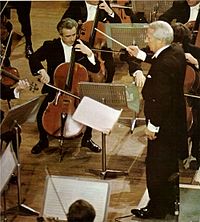- Cockaigne (In London Town)
-
Cockaigne (In London Town), Op. 40, also known as the Cockaigne Overture, is a concert overture for full orchestra composed by the British composer Edward Elgar in 1900-01.
Contents
History
At the beginning of the twentieth century the success of the Enigma Variations had been followed by the initial failure of The Dream of Gerontius, which caused Elgar to be dispirited and declare that God was against art. Nevertheless, on receiving a commission from the Royal Philharmonic Society he began work on the new piece and soon reported that it was 'cheerful and Londony, "stout and steaky"' ... 'honest, healthy, humorous and strong, but not vulgar'.[1]
The first performance was in the Queen's Hall, London at a Royal Philharmonic Society Concert, on 20 June 1901, conducted by the composer. The work was dedicated to the composer's 'many friends, the members of British orchestras'. The music was an immediate success and became one of Elgar's most popular works. It has been performed in the concert hall less frequently in recent decades, though a performance conducted by Britain's then Prime Minister, Edward Heath, at a gala London Symphony Orchestra concert at the Festival Hall in November 1971, pictured, brought Cockaigne to much wider attention than usual.[2]
Description
In its 15 minutes or so the overture gives a lively and colourful musical portrait of Edwardian London. 'Cockaigne' was a term used by moralists at that time as a metaphor for gluttony and drunkenness, while Britain adopted the name humorously for London. There is no narrative programme, but the work presents various aspects of turn-of-the-century London and Londoners. It begins with a quiet but bustling theme which leads into an unbroken sequence of snapshots: the cockneys, the church bells, the romantic couples, a slightly ragged brass band (perhaps the Salvation Army) and a contrastingly grand and imperious military band. The broad theme representing Londoners is, Michael Kennedy states, the first occurrence of Elgar’s trademark direction, 'nobilmente.'.[3] The work ends in a characteristically Elgarian blaze of orchestral sound.
Mindful, perhaps, of the way in which Elgar brings his themes together at the climax of the piece, both Bernard Shaw and W. H. "Billy" Reed compared the work to Richard Wagner's Die Meistersinger von Nürnberg Prelude, which culminates in the combination of several themes. Shaw, in a long article on Elgar in 1920, wrote:
- But if you say that Elgar's Cockaigne overture combines every classic quality of a concert overture with every lyrical and dramatic quality of the overture to Die Meistersinger, you are either uttering a platitude as safe as a compliment to Handel on the majesty of the "Hallelujah" Chorus, or else damning yourself to all critical posterity by uttering a gaffe that will make your grandson blush for you. Personally, I am prepared to take the risk. What do I care for my grandson? Give me Cockaigne.[4]
Reed wrote:
- The Cockaigne Overture does not eclipse the Mastersingers prelude, but neither is it outshone by Wagner's most symphonically satisfying introductory composition from which it actually borrows some procedures. Elgar's piece is as splendidly evocative a picture of Edwardian London as Wagner's is of medieval Nuremberg, and there is nothing to choose between the two in humour, mastery of construction and appositeness of scoring.[5]
Recordings
Cockaigne is well represented on record. Elgar himself recorded it twice (in 1926 and 1933). Recordings currently (January 2007) or recently available include:
- Sir John Barbirolli/Philharmonia Orchestra (EMI)
- Eugene Ormandy/Philadelphia Orchestra (Sony)
- Sir Adrian Boult/London Philharmonic Orchestra (EMI)
- Sir Colin Davis/London Symphony Orchestra (Philips)
- Sir Andrew Davis/BBC Symphony Orchestra (Warner Classics)
- Mark Elder/Hallé Orchestra (Hallé)
- Sir Georg Solti/London Philharmonic Orchestra (Decca)
- Sir Alexander Gibson/Royal Scottish National Orchestra (Chandos)
- Bramwell Tovey/Winnipeg Symphony Orchestra (CBC SMCD 5176)
References
- Kennedy, Michael: 'Elgar Orchestral Music', BBC, London, 1970
- Reed, W.H.: 'Elgar', J M Dent & Sons, London, 1943.
- Laurence, Dan (ed): 'Shaw's Music', Volume III, Bodley Head, London, 1981, ISBN 0-370-31272-4
- Heath, Edward: 'Music', Sidgwick and Jackson, London, 1976, ISBN 0-283-98349-3
- The Elgar Society and The Elgar Foundation
- Madison Symphony Orchestra Program Notes by Michael Allsen
Notes
Categories:- Compositions by Edward Elgar
- Overtures
- 1901 compositions
- Music for orchestra and organ
- London in the arts and media
Wikimedia Foundation. 2010.

